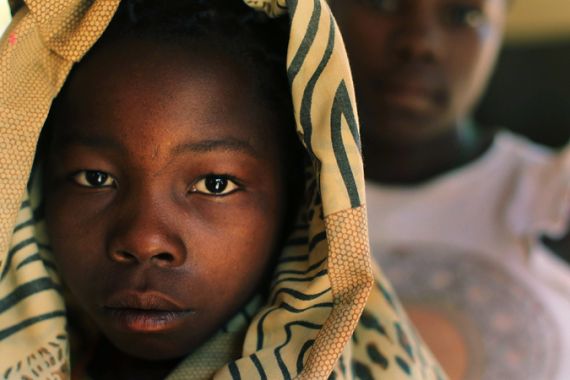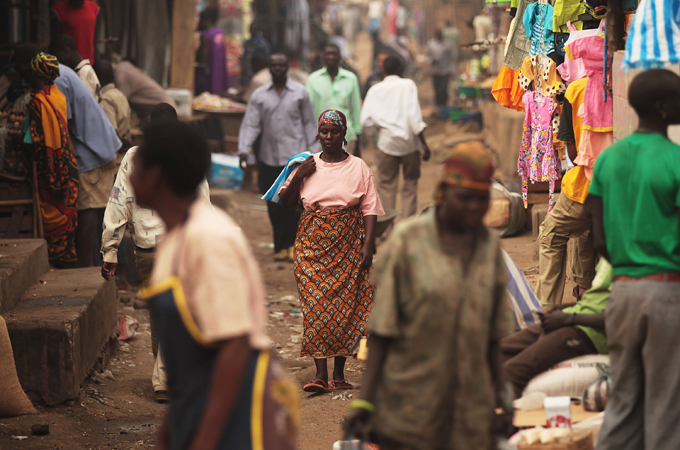World’s newest nation facing challenges
As many refugees return to South Sudan ahead of its official statehood, scarce resources are stretched thin.

 |
| In South Sudan, about nine out of 10 people live on one a dollar per day [GALLO/GETTY] |
In the city of Juba, Sabia Leot’s life is wretched. The 21-year-old is pregnant and for the past five months she’s been homeless, spending most days wandering the streets with her three children desperately trying to find work, food and shelter.
“When it is dry, we sleep under a tree. But when the rains come, we have to hope someone will give us shelter for the night. During the day, I go around people’s houses and ask if I can do small jobs for them. It gets harder because my belly has grown so much. Sometimes they give me some food or a few [Sudanese] pounds. But often, we go hungry. I say to the little ones: Don’t worry, let us sleep. Tomorrow, we will eat.”
Leot is a refugee who recently arrived in Juba, which sits on the White Nile River in the South of Sudan. Juba is one of the fastest growing cities in the world and on the July 9, 2011 it will become the world’s newest capital when the Republic of South Sudan officially comes into existence.
The birth of the new nation was heralded in January when a referendum was held in the southern part of Sudan in which 99.7 per cent of people – predominantly Christians and animists- voted for separation from the Islamic north.
A history of violence
After five decades of war in which more than two million people died, the election result brought fresh hope to hundreds of thousands Sudanese people displaced by conflict. War had broken out after successive Khartoum governments based in the Arabic north withheld investment and influence from the black African south and for years the north’s Sudanese Armed Forces (SAF) clashed with the southern rebels, the Sudan People’s Liberation Army (SPLA), leading to one of the highest civilian death tolls of any conflict since the Second World War.
But while the fighting formally ended in 2005, the peace accord signed back then appears to be unravelling at this historical juncture. Violence has reignited in border areas between north and south in recent months and there have been claims of a ‘new Darfur’ perpetrated by Arab rulers of the north led by Ahmed Haroun, who allegedly are targeting the black African Nuba tribe.
Haroun has already been indicted by the International Criminal Court in The Hague for crimes against humanity and alleged war crimes in Darfur.
In recent months, fighting has raged along the border zone between the two future states – and thousands of refugees are once again on the move.
Oil-rich Abyei in the borderlands was due to have its own referendum on joining the south, but was occupied by Khartoum’s forces in May and thousands have fled from the violence. A deal has now been signed to demilitarise the area and allow Ethiopian peacekeepers into the area while its future is decided.
The irony that war has returned when a new nation is facing so many immense challenges is not lost on Loet, an orphan at the age seven who was raised by an aunt in a village near the southern Sudanese town of Yei.
“My family arranged my marriage to an SPLA soldier when I was fourteen years old. Soon after, my husband was transferred to an army base in the town of Bantu. Life was peaceful for a while until violence broke out at the end of last year. I was three months pregnant with my fourth child,” she says.
In December, Sabia’s husband decided his wife and children should leave the area as fighting had intensified. He gave her money and a cell phone and told her to take the children to Juba.
“I rented a small room for me and the children and my husband said not to worry and that he would send us money every month until it was safe for us to come back. I thought we were going to be fine,” Leot says.
After the first month, however, no more money arrived and Leot and her children were evicted by the landlord. She has no idea where her husband is and with no family to turn to she’s been living hand-to-mouth ever since.
Leot’s situation mirrors that of thousands of other South Sudanese people who are returning from exile.
Returning to nothing
Following the vote for independence, the government of Southern Sudan called upon its citizens to return and rebuild their nation but most returnees have ended up homeless. Some 390,000 Sudanese refugees are still living in camps or urban settings in neighbouring countries, in particular Egypt, Chad, Uganda, Kenya and Ethiopia.
According to the International Organisation for Migration (IOM), over 300,000 people have returned to the south in the past seven months alone. The number of returnees continues to grow and thousands more people are expected to return after July 9.
Despite support from the international community, the influx is putting enormous strain on the limited resources of a country where nine out of 10 people – according to the UN – live on less than one dollar a day.
Shortages of food, drinking water, sanitation and health care are dire and the country’s infrastructure is shambolic. The new Republic of South Sudan covers 400,000 square miles – an area larger than the United Kingdom and Germany combined – yet there are only 19 miles of paved roads.
This makes life highly problematic for charities such as the Scottish Catholic International Aid Fund and Caritas who are in Juba to provide humanitarian assistance to some 100,000 people in urgent need of shelter, food and sanitation.
Isle Simma, head of the coordination unit for the Caritas international group of Catholic relief and development organisations, said: “I don’t think anyone expected this big exodus out of the north. It is a humanitarian crisis because in a country where you have low development standards and very scarce resources, it puts a lot of pressure on the host communities.”
All returning southerners have been promised a piece of land, but that will take time if it happens at all.
Some, such as Archangelo Valentino, 47, who returned from Khartoum in January, have come with nothing. Archangelo is almost completely blind. In Khartoum, he lived with relatives and, unable to find work, found life there harder even than in Juba. “At least in Juba there were greens to eat, but in Khartoum you could go the whole day without food,” he says.
Others have returned from exile with a good education that will be vital in rebuilding South Sudan.
Juan Gore, 39, is a health worker with four children who was partially schooled in Juba. She left in a cargo plane full of evacuees in 1989 and went to Khartoum, where she and three younger siblings completed their schooling. She met and married another South Sudanese, James David Wani, now 48, and the couple then travelled as refugees to Chad and Cameroon in search of a better life before settling in Egypt where James had earlier qualified as a physics and chemistry teacher.
Juan has reservations about Juba. She has three sons and a daughter, aged nine months to 10 years, and they remain in Egypt with her sister-in-law.
“I came back because I wanted to see what it was like. They told me this empty piece of land was my plot. What can I do? I do feel it’s home, but I can’t bring my children. In the night, there is no light and there is no healthcare. I can’t put them in any school near here. In Egypt, they have computers, they have email. There is no email, she says.
Others in the capital exude optimism despite the current problems, including 32 year old Richard Luka who lived in Khartoum as a refugee for 27 years. Growing up there, he lived between two worlds. In school, he spoke Arabic like the other children but at home, the family spoke their mother tongue, Bari, to keep their southern spirit alive.
“My parents used to tell us all about Juba. Whenever they saw it on television, they would call us over. It looked so beautiful to me. My dream was always to go back there. I knew it was my home.”
Luka returned to Juba in 2006 and met his wife Nora Joan in Juba who is nine months pregnant and she is about to deliver the couple’s first child. Their child will be one of the first children of the new Republic of South Sudan.
“It is very special. I will be the proudest father in the world. I have already decided on the baby’s name. Whether it will be a boy or girl, our baby will be called Hora – the Juba-Arabic term for Freedom.”